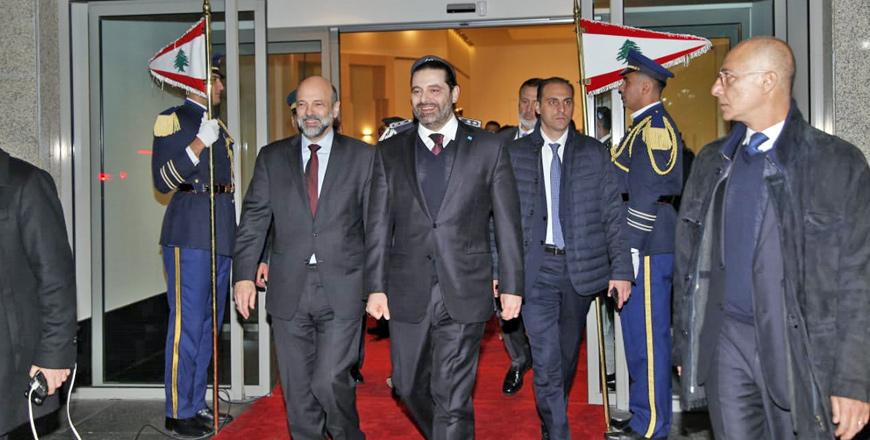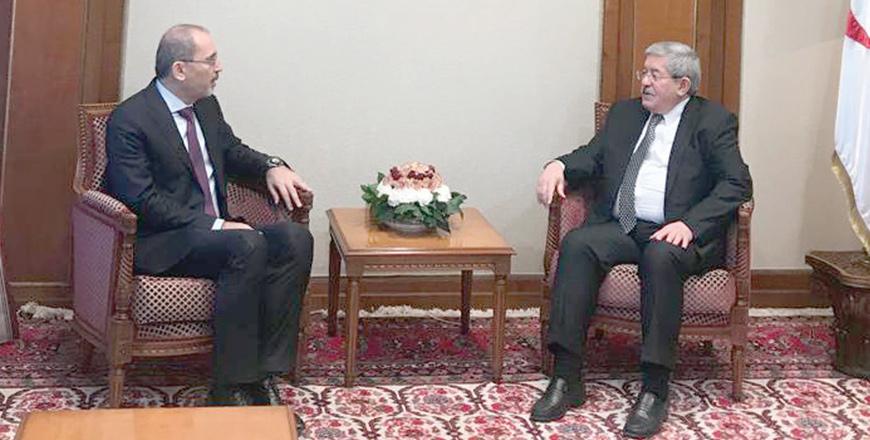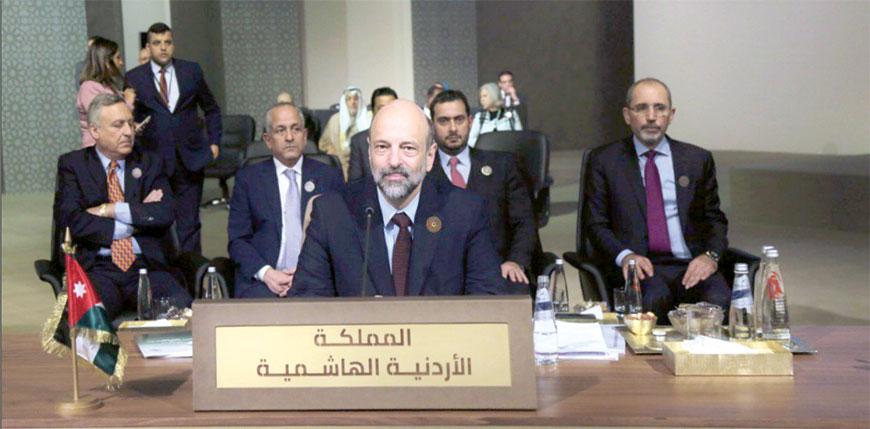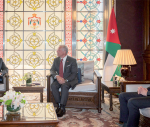You are here
Razzaz to deliver Kingdom’s address at Arab economic, development summit
By JT - Jan 19,2019 - Last updated at Jan 19,2019

Prime Minister Omar Razzaz is received by Lebanon’s Prime Minister-designate Saad Hariri as he arrives in Beirut on Saturday to participate in the fourth Arab Economic and Social Development Summit (Petra photo)
AMMAN — Deputising for His Majesty King Abdullah, Prime Minister Omar Razzaz arrived in Beirut on Saturday to participate in the fourth Arab Economic and Social Development Summit, as Foreign Minister Ayman Safadi delivered the Kingdom’s speech in a preparatory ministerial meeting.
Razzaz is scheduled to address the summit with Jordan’s vision on the importance of enhancing cooperation and economic and trade integration among Arab countries, which constitute the main pillars for realising goals and aspirations under the difficult geopolitical and economic conditions in the Arab world, a government statement said.
Addressing the joint preparatory meeting for foreign ministers and the socioeconomic council, Safadi on Friday said that Arab countries’ economies, security and stability are interconnected and interdependent and, thus, their development processes would grow through institutionalising economic cooperation within a comprehensive vision.
Arabs have “enormous potential and energy”, the minister was quoted by a Foreign Ministry statement as saying.
However, he added, Arabs lack an effective regional cooperation framework to enhance trade exchange, link infrastructures and encourage investments, which could create, out of the Arab world, one big economic bloc to match its human and economic potential.
Wars and crises have depleted Arab resources, frustrated youth and deprived the region of peace and security, which, he said, are the conditions necessary to realise economic growth required to fulfil Arab societies’ needs.
The minister stressed that the Israeli occupation of Palestine remains the most serious threat to regional security, and the root cause of tension and instability that obstructs the comprehensive economic renaissance.
The top diplomat also called for further pan-Arab endeavours to revive international political efforts to resolve the Palestinian-Israeli conflict on the basis of the two-state solution, in accordance with international legitimacy resolutions and the Arab Peace Initiative, which was first initiated in Beirut as a holistic peace strategy, leading to the establishment of a sovereign Palestinian state on the pre-1967 borders, with East Jerusalem as its capital.
He added that Jerusalem, as the Custodian of the city’s Islamic and Christian holy places King Abdullah affirms, is the key to peace, highlighting the need to safeguard the Holy City and preserve its Arab, Islamic and Christian identity.
Safadi noted that meeting the Palestinians’ needs and resolving final status issues are the only means to comprehensive peace.
The minister also called for protecting UNRWA, and expressed appreciation for countries that have contributed to overcoming the agency’s financial deficit.
On Syria, he described the crisis in the neighbouring Arab country as a “wound” that bleeds deaths, destruction and broken families, emphasising the need for an end to the suffering of Syrians.
Safadi called for adopting an effective positive Arab role in efforts aimed at ending the Syrian crisis through a political solution that preserves the territorial integrity and sovereignty of Syria — one that is accepted by Syrians and guarantees the voluntary return of refugees to their homeland, on the basis of UNSC Resolution 2254.
Safadi also referred to Jordan’s economic hardships and the scarce international support for refugees, expressing at the same time the Kingdom’s “unaltered commitment” to the continued provision of basic needs for 1.3 million refugees in the Kingdom, to allow “our brothers and guests” to live in dignity until conditions for their safe return materialise.
Meanwhile, he called for supporting efforts aimed at ending the crisis in Yemen on the basis of UN Resolution 2216, the results of the Gulf Initiative, those of the National Dialogue and the Stockholm agreement.
The minister added that a solution to the Libyan crisis, that guarantees its unity and uproots terrorism, constitutes a stability factor for the Arab world and supports the development process.
Overcoming regional crises is a prerequisite to eradicating terrorism, which, he said, feeds on chaos and broken countries and societies, adding that crises have resulted in massive destruction, which necessitates a pan-Arab reconstruction project.
Arab leaders and top officials will discuss, at the Beirut-hosted summit, several economic files related to food security, the Greater Arab Free Trade Area and energy, among other issues.
The Kingdom’s delegation to the summit comprises Safadi, Industry, Trade and Supply Minister Tareq Hammouri, Jordan’s Ambassador to Egypt and its Permanent Representative at the Arab League Ali Ayed and Jordan’s Ambassador to Lebanon Nabil Masarwah, the Jordan News Agency, Petra, reported.
On the sidelines of the summit, Safadi met with his Lebanese counterpart Gebran Bassil over means to enhance cooperation and develop the Jordanian-Lebanese ties in the economic, trade and investment fields.
Safadi also held another meeting with his Iraqi counterpart Mohamed Alhakim, which focused on mechanisms of following up on the outcomes of King Abdullah’s meetings with Iraqi President Barham Saleh and Prime Minister Adel Abdul Mahdi in Amman and Baghdad, as well as Razzaz’s visit to Iraq.
Both ministers agreed to finalise agreements that would enhance cooperation between the two countries, mainly in the energy, trade and transport sectors.
Related Articles
AMMAN — Minister of Foreign Affairs and Expatriates Ayman Safadi and Algerian Prime Minister Ahmed Ouyahia on Sunday stressed the two countr
AMMAN — Prime Minister Omar Razzaz on Monday said that the Arab Economic and Social Development Summit is held at a time when the Arab world
AMMAN — Foreign Minister Ayman Safadi on Monday met with his Saudi, Omani, Iraqi and Egyptian counterparts on the sidelines of the Arab summ

















